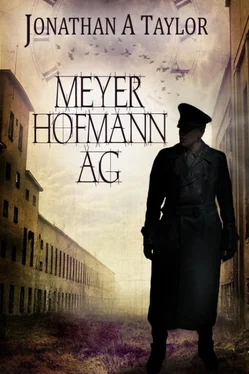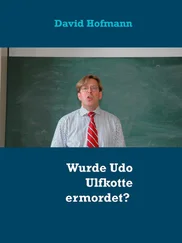Jonathan Taylor - Meyer-Hofmann AG
Здесь есть возможность читать онлайн «Jonathan Taylor - Meyer-Hofmann AG» весь текст электронной книги совершенно бесплатно (целиком полную версию без сокращений). В некоторых случаях можно слушать аудио, скачать через торрент в формате fb2 и присутствует краткое содержание. Год выпуска: 2016, ISBN: 2016, Издательство: Smashwords, Жанр: Триллер, Детективная фантастика, на английском языке. Описание произведения, (предисловие) а так же отзывы посетителей доступны на портале библиотеки ЛибКат.
- Название:Meyer-Hofmann AG
- Автор:
- Издательство:Smashwords
- Жанр:
- Год:2016
- ISBN:978-1-370-07282-8
- Рейтинг книги:3 / 5. Голосов: 1
-
Избранное:Добавить в избранное
- Отзывы:
-
Ваша оценка:
- 60
- 1
- 2
- 3
- 4
- 5
Meyer-Hofmann AG: краткое содержание, описание и аннотация
Предлагаем к чтению аннотацию, описание, краткое содержание или предисловие (зависит от того, что написал сам автор книги «Meyer-Hofmann AG»). Если вы не нашли необходимую информацию о книге — напишите в комментариях, мы постараемся отыскать её.
Meyer-Hofmann AG — читать онлайн бесплатно полную книгу (весь текст) целиком
Ниже представлен текст книги, разбитый по страницам. Система сохранения места последней прочитанной страницы, позволяет с удобством читать онлайн бесплатно книгу «Meyer-Hofmann AG», без необходимости каждый раз заново искать на чём Вы остановились. Поставьте закладку, и сможете в любой момент перейти на страницу, на которой закончили чтение.
Интервал:
Закладка:
The plan was as simple as it was unimaginable. During his research, Furtner had discovered that DNA not only transferred the parents’ physical characteristics to the child, but much of their personalities, and even their experiences. Many of a parent’s traits would become noticeable in a child, but would be attributed to the child learning from and watching its parents. But the same characteristics had been found in the war’s many orphans, including children who had never met their parents. Furtner surmised that these traits were recorded in the child’s DNA, and he might be able to release them. By doing so, he could enhance the positive traits in the children. It was during one such experiment that he noticed a side effect. The children acquired not only the traits, but also many of the parents’ actual memories. They were able to remember and recount actual events and people from their parents’ lives. Many became sure they had experienced the events first-hand. They would experience déjà vu when visiting places from their parents’ childhood. They were often able to describe the places in great detail before the visit. One of the children in the study had become so confused by the experience that he could not recognise his own name, answering only to the name of his father. Further experiments would allow Furtner to tap into those memories, enhance them, and encourage the children to find and use their parents’ memories as the templates of their lives. In time, the parents’ memories became the child’s memories. Their brains’ synapses changed their regular pathways to information in preference for new routes. He found that the children started to act and interact more and more as their parents would the more they remembered of their parents’ lives. When the parents’ memories became exclusive, the child became, in essence, the parent. Although the technique was far from perfected at the time the decision was made, it was decided that this was their best hope.
Each of the board members would father a male child, whose DNA would be augmented. The children would be sent to safe houses spread out across the world, to be collected after the war was over. They would then be helped by the DNA manipulation process to recall their fathers’ lives and experiences and continue their fathers’ work. The board would, in essence, be reborn, with a complete memory of its past, a clear vision of its mission, and more importantly, the tools to carry it out. There was also a bonus: if they were careful, nobody would ever make the connection between the new board and any known members of the Third Reich. The children, who would all be adopted by new parents, with new names, would come from countries with no connection to Germany’s past.
Ecker returned to his seat. The board members muttered between one another before becoming quiet as Reichard took to his feet yet again.
“I would now like to address the matter of purification. Herr Von Klitzing, can you give us a summary before our area chiefs give their reports, please?”
Von Klitzing took to his feet and let his gaze slide around the table. As he collected his thoughts, his right hand went to his chin, pinching it between forefinger and thumb. He stroked it knowingly, letting them sweat. All looked at Von Klitzing with some trepidation. Despite little contact, they all had the greatest respect for him, although most of it was born out of fear. He had been a ruthless man during the war, and none doubted that the man before them was none other than Obergruppenführer Anton Brandt. The man’s incessant rubbing and scratching reminded them all of his grandfather’s habit.
“Gentlemen, this has been a difficult and dangerous procedure for our organisation. I cannot impress on you enough the severity of the problem. The infiltration of our holdings has become an epidemic. Although I understand that the purity of management structures in emerging markets is a challenge, the unbelievable indifference to our goals I have found in the leadership of some companies, is unacceptable!”
Many of the men at the table shuffled in their seats, aware that the admonishment was directed at them. Each was responsible for a group of holdings, their job to steer and manipulate them in a direction that served Meyer-Hofmann’s interests.
“We singled out one hundred and twenty-two employees for immediate redeployment. Of those, fifty-two were convinced by their department heads to seek employment elsewhere by means of a financial incentive. A further twenty-nine were headhunted by a friendly resources company, who redirected them to our competitors. This left us with forty-one difficult cases. Twenty-three of these were responsive to blackmail, the rest were liquidated. In all but one case, we were able to keep the liquidation clean, hitting only the targeted member of staff. In one case, however, we had to make it look like an appliance failure, which cost the entire family their lives. There are, at this time, no signs that any law enforcement agency has made links between the deaths or redundancies. This operation has been difficult to camouflage, and we need you all to be vigilant should any organisation take an unhealthy interest in our work.”
There was a general muttering around the table before Von Klitzing finished.
“This leaves us with one hundred and fifty undesirables in middle and lower management—you know who they are. I expect you to remove them from our holding companies by whatever means necessary. This process should be concluded by the end of the coming year.”
Von Klitzing sat down to a chorus of shuffled chairs and coughs. Reichard, standing again, addressed the man sitting to the right of Dr Ecker.
“Herr Ducker, would you give us your report, please.”
Ducker was the head of North American operations, and as such, the target of most of the accusations. He was not a weak man, and weighing sixteen stones, he was also not a small man. He had removed his jacket, revealing a sweat-sodden blue shirt, his double chin straining against the collar. As all eyes turned in his direction, his complexion became visibly redder. The veins pulsed on both sides of his forehead as water ran freely from his brow. Dabbing the sweat with a handkerchief, he got to his feet, his mind desperately confirming his strategy.
“It is not that easy, Von Klitzing,” he said, finding his composure. “North America, by its very nature, is multicultural, and our assets there are all large corporations. Their human resource departments are enormous; it is impossible to keep track of all their recruitments.”
Ducker had delivered the statement with more force than most at the table had expected. Von Klitzing was back on his feet, stung by the rebuke.
“Your father controlled the majority of the eastern front without forgetting policy. You are a pale imitation!”
Now Ducker was angry. The ultimate insult in this company was to be compared negatively to your father, and it infuriated him.
“Don’t you dare!” Ducker growled the words out. “You are the embodiment of your father, a sewer rat. I can tell you about the eastern front, if you want, Von Klitzing. I remember every day of it; what do you remember? All you have ever been concerned with is not soiling your suit when you torture your victims. I was a soldier, a leader of men—nothing has changed! We are no longer at war. We cannot do as we wish; we must use diplomacy and caution. Managing a company is no different than managing a battle. You must play to your strengths, whilst being aware of your opponent’s strengths and utilising their weaknesses. That is the only way to prevail.”
With both men standing, squaring off against one another across the room, Reichard interrupted.
“Gentlemen, I think that is enough; you have both made your points. I agree with Herr Von Klitzing, there should be closure of this matter by the end of the year. It is, however, not Herr Ducker’s problem alone. We have all been negligent in this matter. We have all lost sight of our mission. I am also at fault. I was not born for the role that was forced upon me. Heinz Hofmann, on the other hand, was—this was his company, his idea. With him back in command, there will be no more mistakes. Now, please, Gentlemen, give your reports, and try to keep them objective.”
Читать дальшеИнтервал:
Закладка:
Похожие книги на «Meyer-Hofmann AG»
Представляем Вашему вниманию похожие книги на «Meyer-Hofmann AG» списком для выбора. Мы отобрали схожую по названию и смыслу литературу в надежде предоставить читателям больше вариантов отыскать новые, интересные, ещё непрочитанные произведения.
Обсуждение, отзывы о книге «Meyer-Hofmann AG» и просто собственные мнения читателей. Оставьте ваши комментарии, напишите, что Вы думаете о произведении, его смысле или главных героях. Укажите что конкретно понравилось, а что нет, и почему Вы так считаете.












